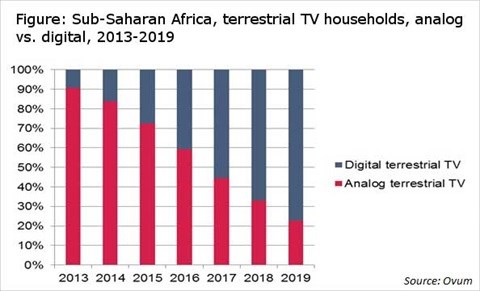Impact of rushed analogue switch-off on African TV

This is despite the mindset, prevalent among many governments and regulators in the region, that the deadline must be met at all costs. As a consequence, numerous sub-Saharan TV markets are considering switching off analogue TV signals before the audience has transitioned to digital. This would mean many homes will lose TV reception, leading to advertisers switching away from TV and, in turn, a decline in TV advertising revenue.
Adam Thomas, Ovum's Lead Analyst for Global TV Markets says: "In Tanzania, the switchover process was pushed through recklessly, with damaging results. Thousands of homes lost their ability to watch TV and advertising revenue suffered as a result. But this mentality to rush the process persists, not least in Kenya which seems intent on repeating the same mistakes."
Ovum research also found an understandable eagerness among regulators to raise revenue from the sale of the spectrum that will become available following analogue switch-off and which will, most likely, be snapped up by mobile operators. This is another factor behind the rushed switchover.

Ovum's Ismail Patel, who tracks media and entertainment across the Asian, Middle Eastern, and African regions, adds: "While the sale of spectrum will benefit the mobile sector, regulators could harm the TV business if they act with undue haste to get their hands on potentially lucrative spectrum. African governments and regulators need to accept that the 2015 deadline will be missed and shift their focus on to getting the process completed as quickly and efficiently as possible. Ovum believes that forcing through analogue switch-off is ultimately counter-productive."
Ovum also discovered that initial digital terrestrial TV ("DTT") launches are dominated by the pay-DTT services of the operators StarTimes and Multichoice.
This has created a sector where the paid-DTT option represents an artificially high percentage of total homes using DTT to receive TV - an issue because people will be less willing to transition from analogue to digital TV if they believe this will mean they have to start paying for TV. The result is that more than 90% of terrestrial TV was still analogue at end-2013 (see Figure).

Figure: Sub-Saharan Africa, terrestrial TV households, analog vs. digital, 2013-2019
According to Thomas: "This early focus on pay DTT has created a misconception among the sub-Saharan audience that DTT is intrinsically a paid service. Once there is awareness that DTT can be received without payment then free-to-air DTT will be the overwhelming choice for most homes and the transition from analog to digital will be better placed to proceed. This may mean StarTimes and Multichoice will be disappointed with the number of pay DTT subscribers that they can ultimately attract."






















